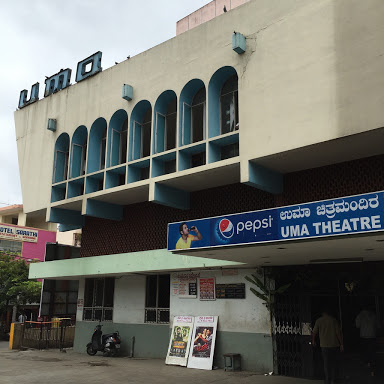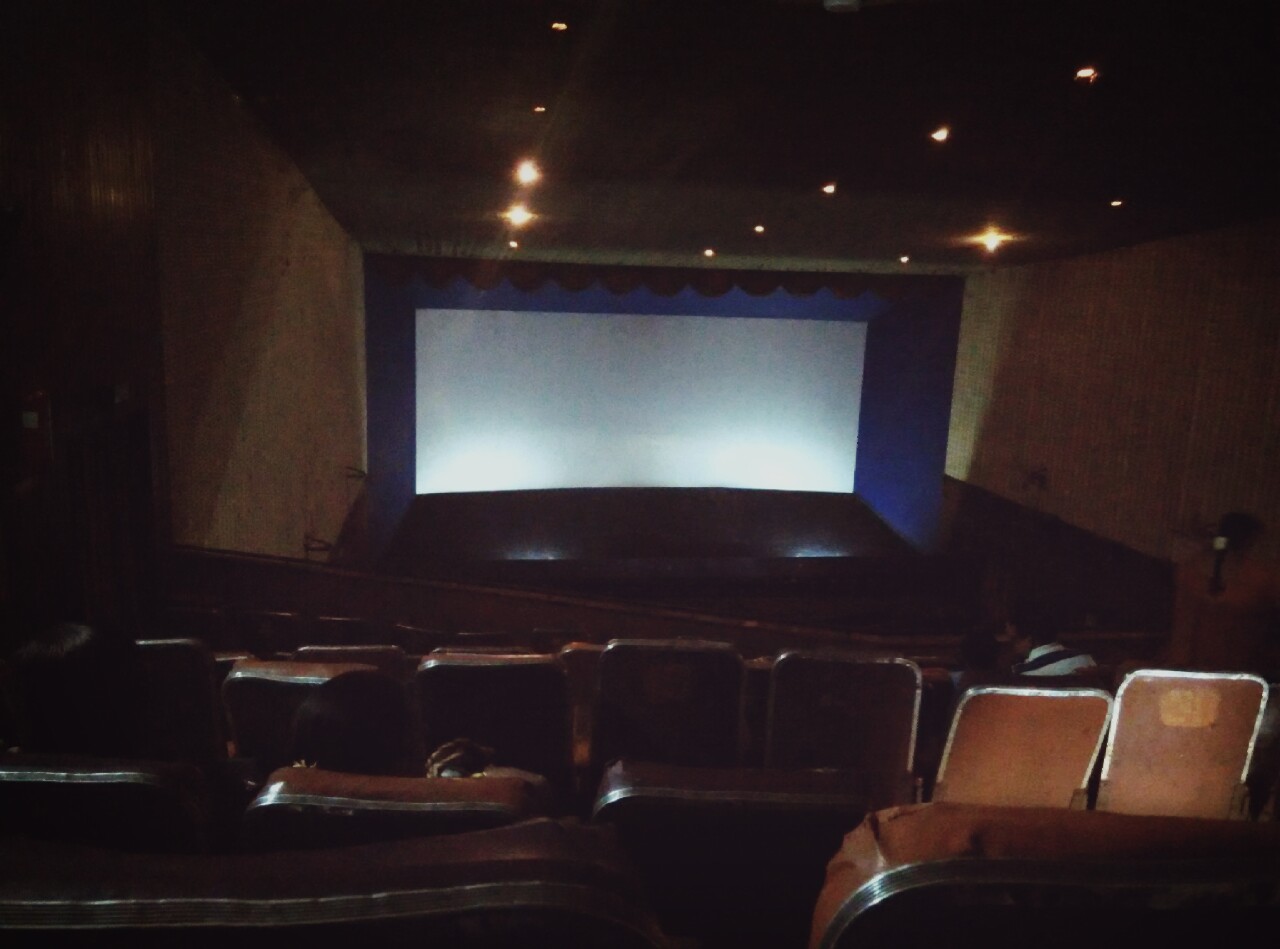It has been ages since I watched a Kannada film, especially one in a stand-alone theatre. When Amma told me that she and Ajji were headed to watch a Kannada film I didn’t bat an eye; I continued watching Iron Man 3 for the tenth time on Sony Pix. But later, after a lot of prodding and probing and emotional drama from the two women I went anyways. I resolved to never let them watch Hindi-soaps ever again when we were back from the film.
The film had released a few weeks earlier and was now being screened only in Uma Theatre, this was quite close to our house. The film was widely advertised in the newspapers, on Hindi radio channels, and between daily soaps on television. We reached half an hour before the movie to be greeted with a ticket counter queue that ran all the way to the back of the theatre to the parking lot. We took our place in the queue and waited.
I had once watched on News9 an interview with the four lead actors of the film- Gurunandan, Apoorva Gowda, Tanishka Kapoor, and Chandru. They went on and on about how this is a movie for the younger generation and that it was a must watch. The actor Gurunandan had put in so much effort into the movie that he would walk around the sets in his character rather than by being himself. “We would like you all to watch the movie for at least his efforts, if not for the movie itself”, Chandru, his co-star had said while the actresses seemed oblivious to the surroundings and stood there plastered with a smile and a few giggles.

The line moved quite fast once the counter was open. The pink tickets for the balcony seats were Rs 70 and the yellow ones for the seats on the lower level were Rs 50. Taking the pink tickets from the counter I asked the ticket-man if he had given us corner seats. He laughed at me and looked at me like I was the most amusing person he had seen in a long time and said “Bega voddhogu, illa andre nin ‘corner seat’ sikkolla (Run fast or you won’t get your corner seat)”.
I did as he had instructed me to, and saved seats for the two women. Next to us a family with two little kids took their seats. The floor was still covered with plastic wrappers and popcorn from the show before; the patterned-ceiling which was perhaps once white, was now a light shade of brown. The wooden walls were broken and chipped off in places, just as the seats were- brown with broken springs and torn covers. The fans rattled into life, just as the last of the families began to find seats for themselves.
There were no ‘modern’ advertisements as such, but there were saree-shop advertisements in the form of projector slides that had to be manually changed. Ajji saw someone in the crowd who walked in late and exclaimed “That’s Upendra’s mother! I’ve seen her on TV shows! She’s come to watch a movie in our Uma theatre!”
Raju is born, and the world around him begins to choose professions for him. His father decides that he would be named ‘first rank Raju’, his mother gets it reduced to Raju. Raju grows up with lots of love and care and education and no play. His father encourages conditions him into learning and by-hearting every book he finds so Raju can come first in his class. Raju learns to question (with the usual curiosity that children begin to question), but he’s immediately beaten and told that ‘questions are not in the syllabus’.
At eight, he’s denied a tennis ball that he plays with and the windows of his room are bared shut so he can’t hear the children outside playing. As he grows up, he begins to defy the myth ‘all work and no play makes Jack a dull boy’.
The audience laughed where the film told them to, but never at the way the little boy was being brought up. It seemed like all the older ones in the audience were there for a parenting-101 course, while the younger generation saw a horror movie unfold before their eyes.
Raju eventually grows up and is denied an offer at a job interview because his knowledge is too book-ish and the company needs an all rounder- someone with an active interest extracurricular. Our man is appalled, says “Haw! These are things back-benchers do!” to the interviewer, played by Anant Nag. And the audience giggles but agrees.
Backbenchers, a term given to people who generally do ‘bad-bad’ things like taking part in sports, performing at cultural functions, and going out with friends to restaurants –eventually fail in their exams. Unfortunately for me, I know far too many people who are ‘backbenchers’ and perform exceptionally well academically. But thanks to the film, my grandma who is excessively interested in my geographic position in class, to the last latitude and longitude, called Germany to ask my cousin where he sits in class.
After the unsuccessful suicide attempt, Raju’s parents decide to make him a ‘backbencher’ so they send him to the gym, take him to the best saloons to get him a makeover (that is, to get him to learn how to efficiently use shampoo to wash off all the coconut hair oil), get him new clothes in keeping with the trends, tell him to befriend all the backbenchers, and get a girlfriend. After this, first rank Raju is now renamed Raj. Nope not just Raj, it is ‘Raj -The Showman’. ‘The Showman’ part is important, you shouldn’t forget it. After the first three on the list, Raj the Showman now needs a girlfriend.

Interval.
As the lights slowly come back on, many of the people around reach into their bags and remove books. A few people get up and move out of the theatre but a large part of it stays in their seats munching away on stuff they bought from home. There was a time when films were picnics, families prepared elaborately for it so that the children wouldn’t remain hungry through the course of the film. They would pack bottles of water and khara-chips, chakli and sweets and stuff. That didn’t seem to have changed much for those who came here, only a few of the people that returned a packet of sealed popcorn in their hands. I remember paying more than 500 bucks for a plate of tacos and cheese, and a bucket of popcorn in the multiplex I’d gone to a day before.
The second half hummed into life. Raj the showman quickly gets everything that he wants but loses everything else even more quickly when his friends realised he’s a self-centred puppet. He then goes on to travel to discover himself, but not before transforming back into Raju.
His transformation to become what he was before is rather simple- he ruffles his hair, sheds his contact lenses for frameless glasses, and removes the neck scarf that he used to wear in summer. His travels resemble Shaan’s song Tanha Dil, at the ending of which he runs into a couple of seven-year olds attempting suicide. He then saves them and begins to fight for a social cause- which is a better system of education.
I walked out before the crowd and waited, the parking lot was already filled with the people who were there to watch the next show. The theatre seemed to only screen Telugu and Kannada films, a poster of a nameless horror-comedy film stretched from one end of the wall to the other. There were two huge posters of First Rank Raju, the posters seemed like a grade one student had taken pictures of first-time stars unexpectedly and had attempted to make a collage with it but had somehow managed to stick the pictures old timers like Anant Nag, Sudha Belwadi, and Achyuth Kumar, in a more organised way.
Ajji struck a conversation with someone else her age. “Nice movie alwa”, she said. “It was funny till now, the way parents encourage children to study is understandable. It’s necessary, this world- its competition. But what is this nonsense? Which parent tells his child to go and love” she exclaimed. “Yeno, sumne we watch all these things”.
Latest posts by Niveadha Eshwaran (see all)
- Back-benching with First Rank Raju - 27th January 2016
- Jurassic Park – I mean – World - 1st July 2015
- Shakespeare’s Birugaali - 25th June 2015






1 Pingback